ART NEWS:March 02
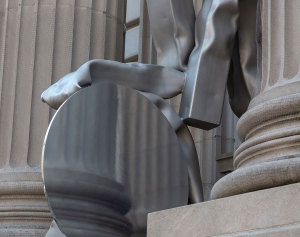 Carol Bove has created four sculptures for The Met Fifth Avenue’s facade niches. “The Facade Commission: Carol Bove”, For her sculptures, Bove chose a series of nonrepresentational forms that resonate with modernist styles such as Art Deco and abstraction—a stark contrast to the traditional figurative sculptures that the architect Richard Morris Hunt intended to feature (yet never realized) on the facade, which was completed in 1902. Bove based the size of the aluminum disks on the diameter of the columns that flank the Museum’s niches and the medallion portraits that adorn the spandrels of the arches. The differing orientations result in a playful rhythmic pattern, yielding a frisson of delight that might throw us slightly off balance. By astutely engaging the Museum’s 119-year-old facade, reimagining its history, and retooling some of its architectural and design elements, the artist subtly calls for us to reevaluate and reckon with the legacies of tradition. As the title—The séances aren’t helping—suggests and Bove’s works demonstrate, grappling with the past can be a challenging yet powerful exercise. Info: The Metropolitan Museum of Art, The Met Fifth Avenue, 1000 Fifth Avenue at 82nd Street, New York, Duration: 1/3-30/11/2021, www.metmuseum.org
Carol Bove has created four sculptures for The Met Fifth Avenue’s facade niches. “The Facade Commission: Carol Bove”, For her sculptures, Bove chose a series of nonrepresentational forms that resonate with modernist styles such as Art Deco and abstraction—a stark contrast to the traditional figurative sculptures that the architect Richard Morris Hunt intended to feature (yet never realized) on the facade, which was completed in 1902. Bove based the size of the aluminum disks on the diameter of the columns that flank the Museum’s niches and the medallion portraits that adorn the spandrels of the arches. The differing orientations result in a playful rhythmic pattern, yielding a frisson of delight that might throw us slightly off balance. By astutely engaging the Museum’s 119-year-old facade, reimagining its history, and retooling some of its architectural and design elements, the artist subtly calls for us to reevaluate and reckon with the legacies of tradition. As the title—The séances aren’t helping—suggests and Bove’s works demonstrate, grappling with the past can be a challenging yet powerful exercise. Info: The Metropolitan Museum of Art, The Met Fifth Avenue, 1000 Fifth Avenue at 82nd Street, New York, Duration: 1/3-30/11/2021, www.metmuseum.org
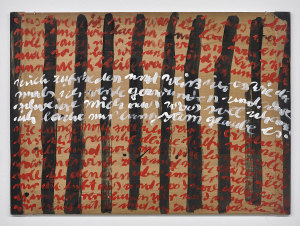 The exhibition “Permanente Veränderung” presents works by Oswald Oberhuber. His works cover a broad artistic spectrum: pieces using or built from plastic, paintings, collages, assemblies and sculptures. Oberhuber has also created individual pieces of fabric art and numerical paintings. Oberhuber studied sculpture at the Federal Crafts School in Innsbruck from 1945 to 1949. He then enrolled at the Academy of Fine Arts in Vienna, where he was taught by Fritz Wotruba. Later on, he attended the Academy in Stuttgart, studying under Willi Baumeister. He quickly made a name for himself as a respected art connoisseur, attending public events, for instance as artistic consultant to the Galerie nächst St. Stephan in 1964/65, where he was director until 1978. He represented Austria at the Venice Biennale in 1972. Moreover, Oberhuber was professor at the University of Applied Arts in Vienna from 1973 to 1998, and its dean for eight years during this period. An honorary member of the Stuttgart Academy from 1982, he was appointed its honorary senator in 2004. Info: KOW, Lindenstr. 35, Berlin, Duration: 8/3-18/4/2021, Days & Hours: Tue-Sat 12:00-18:00, https://kow-berlin.com
The exhibition “Permanente Veränderung” presents works by Oswald Oberhuber. His works cover a broad artistic spectrum: pieces using or built from plastic, paintings, collages, assemblies and sculptures. Oberhuber has also created individual pieces of fabric art and numerical paintings. Oberhuber studied sculpture at the Federal Crafts School in Innsbruck from 1945 to 1949. He then enrolled at the Academy of Fine Arts in Vienna, where he was taught by Fritz Wotruba. Later on, he attended the Academy in Stuttgart, studying under Willi Baumeister. He quickly made a name for himself as a respected art connoisseur, attending public events, for instance as artistic consultant to the Galerie nächst St. Stephan in 1964/65, where he was director until 1978. He represented Austria at the Venice Biennale in 1972. Moreover, Oberhuber was professor at the University of Applied Arts in Vienna from 1973 to 1998, and its dean for eight years during this period. An honorary member of the Stuttgart Academy from 1982, he was appointed its honorary senator in 2004. Info: KOW, Lindenstr. 35, Berlin, Duration: 8/3-18/4/2021, Days & Hours: Tue-Sat 12:00-18:00, https://kow-berlin.com
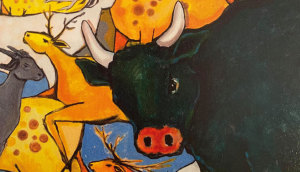 Unfolding through an exhibition, online residency, public program and Summer Academy, the exhibition project “Postcolonial Ecologies” discusses and reflects on essential ecological questions, addressing how colonial practices and extractive economies have affected/contaminated the natural environments of indigenous peoples and native ecosystems. Departing from the epistemic violence enacted through dominant technologies of measurement and calculation that subdue life forms to market logic, “Postcolonial Ecologies” unearths indigenous knowledge systems rooted in conceptions of nature and land as sources of life and subsistence. Thinking with Fanon, participants are invited to engage in critical readings of decolonization and to speculate on life futures that acknowledge land as “the most essential value,” its humus at once a carrier of collective memory/trauma and a site of anticolonial resurgence and regeneration. Against a modern grammar of predation and extraction, the multifaceted program invokes other worlds in the making, exploring radical forms of social organisation that centre mutual aid and more-than-human collaboration. Participating artists include: Ali Jabri, Ahmad Nawash, Amal Kenawy, Asunción Molinos Gordo, Etel Adnan, Gouider Triki, Jananne Al-Ani, Jumana Emil Abboud, Laila Shawa, Maha Mustafa, Moataz Nasr, Mohammad Hawajri, Mona Hatoum, Nicola Saig, Rachid Koraïchi, Samia Halaby, Vladimir Tamari and Wael Shawky. Info: Curators: Joud Al-Tamimi, Firas Shehadeh and Reem Marji, Darat al Funun–The Khalid Shoman Foundation, 9 Moh’d Ali al Saadi St. Jabal al Weibdeh, Amman, duration: 9/3-30/9/2021, Days & Hours: Sat-Thu 10:00-19:00, https://daratalfunun.org
Unfolding through an exhibition, online residency, public program and Summer Academy, the exhibition project “Postcolonial Ecologies” discusses and reflects on essential ecological questions, addressing how colonial practices and extractive economies have affected/contaminated the natural environments of indigenous peoples and native ecosystems. Departing from the epistemic violence enacted through dominant technologies of measurement and calculation that subdue life forms to market logic, “Postcolonial Ecologies” unearths indigenous knowledge systems rooted in conceptions of nature and land as sources of life and subsistence. Thinking with Fanon, participants are invited to engage in critical readings of decolonization and to speculate on life futures that acknowledge land as “the most essential value,” its humus at once a carrier of collective memory/trauma and a site of anticolonial resurgence and regeneration. Against a modern grammar of predation and extraction, the multifaceted program invokes other worlds in the making, exploring radical forms of social organisation that centre mutual aid and more-than-human collaboration. Participating artists include: Ali Jabri, Ahmad Nawash, Amal Kenawy, Asunción Molinos Gordo, Etel Adnan, Gouider Triki, Jananne Al-Ani, Jumana Emil Abboud, Laila Shawa, Maha Mustafa, Moataz Nasr, Mohammad Hawajri, Mona Hatoum, Nicola Saig, Rachid Koraïchi, Samia Halaby, Vladimir Tamari and Wael Shawky. Info: Curators: Joud Al-Tamimi, Firas Shehadeh and Reem Marji, Darat al Funun–The Khalid Shoman Foundation, 9 Moh’d Ali al Saadi St. Jabal al Weibdeh, Amman, duration: 9/3-30/9/2021, Days & Hours: Sat-Thu 10:00-19:00, https://daratalfunun.org
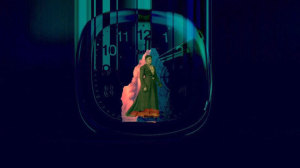 Out of this current unstable social context, the exhibition “If Time Is Still Alive-The City & The Good Life”, asks, in general, what new forms of time, what temporal practices and ways of being, already exist within or under what Elizabeth Freeman has called “chrononormativity.” And what new forms of non-hegemonic time might emerge? Will the long-promised reconfiguration of time and life and work materialize in a way that will make more life possible, perhaps even a good life, a better life? Will artistic practices and the practices of those at the margins of time be able to create chronotopes—connections between space and time—that make these new time-space relations visible in their importance for public life, politics, and society? The works of the Black Quantum Futurism Collective (BQFC), a collaboration between Camae Ayewa and Rasheedah Phillips, opens up a Black radical time through chronopolitical acts of listening, of community organizing, and through, as Phillips writes, “new communal temporal dynamics”/ Info: Curators: Urban Subjects (Sabine Bitter, Jeff Derksen, Helmut Weber), Camera Austria, Lendkai 1, Graz, Duration: 12/3-23/5/2021, Days & Hours: Tue-Sun 10:00-18:00, https://camera-austria.at
Out of this current unstable social context, the exhibition “If Time Is Still Alive-The City & The Good Life”, asks, in general, what new forms of time, what temporal practices and ways of being, already exist within or under what Elizabeth Freeman has called “chrononormativity.” And what new forms of non-hegemonic time might emerge? Will the long-promised reconfiguration of time and life and work materialize in a way that will make more life possible, perhaps even a good life, a better life? Will artistic practices and the practices of those at the margins of time be able to create chronotopes—connections between space and time—that make these new time-space relations visible in their importance for public life, politics, and society? The works of the Black Quantum Futurism Collective (BQFC), a collaboration between Camae Ayewa and Rasheedah Phillips, opens up a Black radical time through chronopolitical acts of listening, of community organizing, and through, as Phillips writes, “new communal temporal dynamics”/ Info: Curators: Urban Subjects (Sabine Bitter, Jeff Derksen, Helmut Weber), Camera Austria, Lendkai 1, Graz, Duration: 12/3-23/5/2021, Days & Hours: Tue-Sun 10:00-18:00, https://camera-austria.at
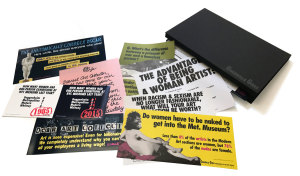 Traditionally understood as narrations about gods, creation, and sanctity, myths are stories that are widely shared and factually ambiguous. They tell unverified truths, educate and entertain at the same time, and create archetypes from simple characters. “JSC ON VIEW: MYTHOLOGISTS” addresses the tensions created between facts and fictions through the production of personal as well as collective narratives. The works each grapple with various mythologies by reinterpreting histories, disrupting established behaviors, and imagining new visual and sonic worlds. What binds them together is that the limits between myth, fact, and fantasy are unclear—whether or not by the artist’s own making. Through everyday acts of pretending and performing, the works ask: What—if anything—can be trusted? How is meaning assigned to these stories? Who creates these myths and which ones will be carried into the future? Info: Curator: Rachel Vera Steinberg, Julia Stoschel Collection Düsseldorf, Schanzenstrasse 54, Düsseldorf, Duration 13/3-19/12/2021, Days & Hours: by appointment only (book here), www.jsc.art
Traditionally understood as narrations about gods, creation, and sanctity, myths are stories that are widely shared and factually ambiguous. They tell unverified truths, educate and entertain at the same time, and create archetypes from simple characters. “JSC ON VIEW: MYTHOLOGISTS” addresses the tensions created between facts and fictions through the production of personal as well as collective narratives. The works each grapple with various mythologies by reinterpreting histories, disrupting established behaviors, and imagining new visual and sonic worlds. What binds them together is that the limits between myth, fact, and fantasy are unclear—whether or not by the artist’s own making. Through everyday acts of pretending and performing, the works ask: What—if anything—can be trusted? How is meaning assigned to these stories? Who creates these myths and which ones will be carried into the future? Info: Curator: Rachel Vera Steinberg, Julia Stoschel Collection Düsseldorf, Schanzenstrasse 54, Düsseldorf, Duration 13/3-19/12/2021, Days & Hours: by appointment only (book here), www.jsc.art
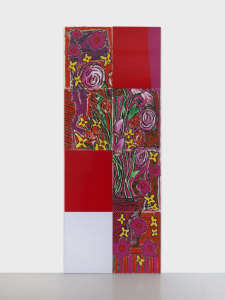 Thomas Liu Le Lann presents a new set of sculptures and paintings that cover a wide spectrum of techniques. Entitled “17” the exhibition features velvet paintings adorned with sick vinyl hearts, oversized glass lollipops, a pair of shoes, a replica of the pharmacy cabinet in his apartment, a poem intended for a lover, and other artworks. This collection of works will be accompanied by a soft hero sculpture, both guardian and actor of this installation. Thomas Liu Le Lann is a multidisciplinary artist who creates installations in different media including sculptures in fabric, glass or wood, paintings, poetry and found objects and generates environments that reference the history of art and popular culture, but also the most ordinary events of everyday life. The artist plays with hierarchies and questions themes of identities, gender, appropriation and social relations. In 2018, the artist introduced a figure of “soft heroes” which seeks to deconstruct the dominant heroic model and its cumbersome representations. True protagonists of his work, these sculptures are endowed with human manners, they lasciviously inhabit the artist’s exhibitions and are identified with people dear to him. Info: Xippas Gallery, 108 rue Vieille du Temple, Paris, Duration: 13/3-29/5/2021, Days & Hours: Tue-Sat 10:00-18:00, www.xippas.com
Thomas Liu Le Lann presents a new set of sculptures and paintings that cover a wide spectrum of techniques. Entitled “17” the exhibition features velvet paintings adorned with sick vinyl hearts, oversized glass lollipops, a pair of shoes, a replica of the pharmacy cabinet in his apartment, a poem intended for a lover, and other artworks. This collection of works will be accompanied by a soft hero sculpture, both guardian and actor of this installation. Thomas Liu Le Lann is a multidisciplinary artist who creates installations in different media including sculptures in fabric, glass or wood, paintings, poetry and found objects and generates environments that reference the history of art and popular culture, but also the most ordinary events of everyday life. The artist plays with hierarchies and questions themes of identities, gender, appropriation and social relations. In 2018, the artist introduced a figure of “soft heroes” which seeks to deconstruct the dominant heroic model and its cumbersome representations. True protagonists of his work, these sculptures are endowed with human manners, they lasciviously inhabit the artist’s exhibitions and are identified with people dear to him. Info: Xippas Gallery, 108 rue Vieille du Temple, Paris, Duration: 13/3-29/5/2021, Days & Hours: Tue-Sat 10:00-18:00, www.xippas.com
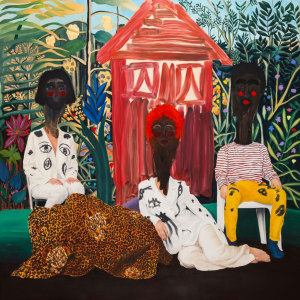 Jannis Varelas’ new solo exhibition, “Double-Blind”, consists of a new body of work, spanning painting, sculpture, works on paper, video and installation , that expands his distinctive visual language into various new registers and forms. Varelas employs a range of different media and physical scales to register a complex array of scenographies. The exhibition follows the artist’s solo presentation Anima I at the Benaki Museum, Athens and it picks up on threads that have run through his work from the beginning – the agency invested in objects and the domestic space as constructors of narrative and identity, the central place of the body and its psychogeography, a performative process of metamorphoses of the self, the collective subconscious and its repressed desires and impulses. Employing a diverse array of materials, the interwoven elements of these works further the artist’s exploration of a psychosexual and cultural anthropology of the contemporary by means of a newly expressive painterly language. Info: The Breeder, 45 Iasonos st, Athens, Duration: 18/3-29/5/2021, Days & Hours: Tue-Fri 12:00-20:00, Sat 12:00-18:00, https://thebreedersystem.com
Jannis Varelas’ new solo exhibition, “Double-Blind”, consists of a new body of work, spanning painting, sculpture, works on paper, video and installation , that expands his distinctive visual language into various new registers and forms. Varelas employs a range of different media and physical scales to register a complex array of scenographies. The exhibition follows the artist’s solo presentation Anima I at the Benaki Museum, Athens and it picks up on threads that have run through his work from the beginning – the agency invested in objects and the domestic space as constructors of narrative and identity, the central place of the body and its psychogeography, a performative process of metamorphoses of the self, the collective subconscious and its repressed desires and impulses. Employing a diverse array of materials, the interwoven elements of these works further the artist’s exploration of a psychosexual and cultural anthropology of the contemporary by means of a newly expressive painterly language. Info: The Breeder, 45 Iasonos st, Athens, Duration: 18/3-29/5/2021, Days & Hours: Tue-Fri 12:00-20:00, Sat 12:00-18:00, https://thebreedersystem.com
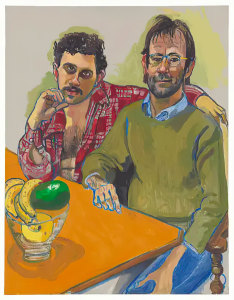 “People Come First” is the first museum retrospective in New York of Alice Neel in 20 years. This ambitious, career-spanning survey at The Met positions Neel as one of the century’s most radical painters, a champion of social justice whose longstanding commitment to humanist principles inspired her life as well as her art, as demonstrated in the survey’s approximately 100 paintings, drawings, and watercolors. The exhibition spans the entirety of the artist’s career, from her professional launch in Cuba in the 1920s and her work as part of the W.P.A. in the 1930s, through her resolute commitment to centering the figure in her painting at a time when abstraction was ascendant, in the 1940s and 1950s; her resurgence in the 1960s and 1970s; and the emergence of her “late style” in the 1980s. In keeping with the artist’s commitment to painting “pictures of people,” which she considered to be historical records of the time in which they were made, the exhibition will feature dozens of Neel’s most striking portraits, celebrated today for their unyielding psychological acumen. The survey also sheds light on her accomplishments in other genres, specifically still lifes, landscapes, and cityscapes. The inclusion of relevant ephemera and personal effects illuminates her relationships, personality, and political convictions as well as her eventual entree into American popular culture. The Metropolitan Museum of Art, The Met Fifth Avenue, 1000 Fifth Avenue at 82nd Street, New York, Duration: 22/3-1/8/2021, www.metmuseum.org
“People Come First” is the first museum retrospective in New York of Alice Neel in 20 years. This ambitious, career-spanning survey at The Met positions Neel as one of the century’s most radical painters, a champion of social justice whose longstanding commitment to humanist principles inspired her life as well as her art, as demonstrated in the survey’s approximately 100 paintings, drawings, and watercolors. The exhibition spans the entirety of the artist’s career, from her professional launch in Cuba in the 1920s and her work as part of the W.P.A. in the 1930s, through her resolute commitment to centering the figure in her painting at a time when abstraction was ascendant, in the 1940s and 1950s; her resurgence in the 1960s and 1970s; and the emergence of her “late style” in the 1980s. In keeping with the artist’s commitment to painting “pictures of people,” which she considered to be historical records of the time in which they were made, the exhibition will feature dozens of Neel’s most striking portraits, celebrated today for their unyielding psychological acumen. The survey also sheds light on her accomplishments in other genres, specifically still lifes, landscapes, and cityscapes. The inclusion of relevant ephemera and personal effects illuminates her relationships, personality, and political convictions as well as her eventual entree into American popular culture. The Metropolitan Museum of Art, The Met Fifth Avenue, 1000 Fifth Avenue at 82nd Street, New York, Duration: 22/3-1/8/2021, www.metmuseum.org
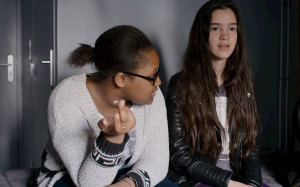 The exhibition “Sammlung” presents works from the MMK collection ranging in date from the early 1960s to the present, including some of the museum’s newest acquisitions. “But do you know what origin is?” Guy-Yanis asks his friend David in Un film dramatique (2019) by Éric Baudelaire. The two school pupils and authors of the film project vehemently discuss the definition of national affiliation, identity, and racism, ultimately resorting to the article on “origine” in Wikipedia. For his language piece “Good Boy Bad Boy” (1985), Bruce Nauman filmed an actress and an actor synchronously speaking the same one hundred simple sentences. With every repetition, they utter the statements more and more forcefully until finally the speakers’ synchronicity as well as the relationship between truth, meaning, and emotion are entirely out of joint. In “Borrowed Lady” (2016), Martine Syms choreographs this normative communication space as a kaleidoscope of specific, recognizable gestures and expressions of African American women, some known from the media, others not. Hands, facial play, and the choice and accentuation of the words together form a political and cultural vocabulary with which Syms draws the viewers into spatial discourse. And while the pieces by Horst Ademeit, Thomas Ruff, and Jeff Wall meticulously examine identification and observation as the foundations of surveillance, those by Marlene Dumas, Sammy Baloji, Thomas Bayrle, and Tishan Hsu revolve around religion and ritual, body technology, and gender. Info: MMK Museum für Moderne Kunst, TOWER, TaunusTurm, Taunustor 1, Frankfurt am Main, Duration: -30/5/2021, Days & Hours: Tue & Thu-Sun 11:00-18:00, wed 11:00-20;00, www.mmk.art
The exhibition “Sammlung” presents works from the MMK collection ranging in date from the early 1960s to the present, including some of the museum’s newest acquisitions. “But do you know what origin is?” Guy-Yanis asks his friend David in Un film dramatique (2019) by Éric Baudelaire. The two school pupils and authors of the film project vehemently discuss the definition of national affiliation, identity, and racism, ultimately resorting to the article on “origine” in Wikipedia. For his language piece “Good Boy Bad Boy” (1985), Bruce Nauman filmed an actress and an actor synchronously speaking the same one hundred simple sentences. With every repetition, they utter the statements more and more forcefully until finally the speakers’ synchronicity as well as the relationship between truth, meaning, and emotion are entirely out of joint. In “Borrowed Lady” (2016), Martine Syms choreographs this normative communication space as a kaleidoscope of specific, recognizable gestures and expressions of African American women, some known from the media, others not. Hands, facial play, and the choice and accentuation of the words together form a political and cultural vocabulary with which Syms draws the viewers into spatial discourse. And while the pieces by Horst Ademeit, Thomas Ruff, and Jeff Wall meticulously examine identification and observation as the foundations of surveillance, those by Marlene Dumas, Sammy Baloji, Thomas Bayrle, and Tishan Hsu revolve around religion and ritual, body technology, and gender. Info: MMK Museum für Moderne Kunst, TOWER, TaunusTurm, Taunustor 1, Frankfurt am Main, Duration: -30/5/2021, Days & Hours: Tue & Thu-Sun 11:00-18:00, wed 11:00-20;00, www.mmk.art
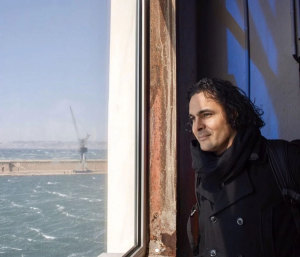 Kader Attia appointed as curator of the 12th Berlin Biennale for Contemporary Art For over two decades, Kader Attia has worked with the concept of “repair” in his artistic practice. It allows him to investigate the dialectic between destruction and repair, in which repair is understood as a way of cultural resistance as well as a means for a society or a subject to reappropriate their history and identity. Raised in France and Algeria, Kader Attia studied philosophy and art in Paris and Barcelona; today he lives and works in Berlin and Paris. In 2016, Kader Attia founded La Colonie in Paris’ 10th arrondissement as a space for the exchange of ideas and discussions focusing on decolonization, not only of people but also of knowledge, attitudes, and practices. Driven by the urgency of social and cultural reparation, it aims to reunite what has drifted apart or been broken. Since March 2020, La Colonie has been closed to the public due to the Covid-19 pandemic. In March 2021, the Haus der Kulturen der Welt in Berlin hosts the fourth part of a conference series initiated by Kader Attia, Ana Teixeira Pinto, and Giovanna Zapperi entitled “The White West”.
Kader Attia appointed as curator of the 12th Berlin Biennale for Contemporary Art For over two decades, Kader Attia has worked with the concept of “repair” in his artistic practice. It allows him to investigate the dialectic between destruction and repair, in which repair is understood as a way of cultural resistance as well as a means for a society or a subject to reappropriate their history and identity. Raised in France and Algeria, Kader Attia studied philosophy and art in Paris and Barcelona; today he lives and works in Berlin and Paris. In 2016, Kader Attia founded La Colonie in Paris’ 10th arrondissement as a space for the exchange of ideas and discussions focusing on decolonization, not only of people but also of knowledge, attitudes, and practices. Driven by the urgency of social and cultural reparation, it aims to reunite what has drifted apart or been broken. Since March 2020, La Colonie has been closed to the public due to the Covid-19 pandemic. In March 2021, the Haus der Kulturen der Welt in Berlin hosts the fourth part of a conference series initiated by Kader Attia, Ana Teixeira Pinto, and Giovanna Zapperi entitled “The White West”.
